
We need to expand our team of proofreaders as we aim to increase the rate of republication of Satsvarūpa Mahārāja’s books as well as new books that he writes.
This includes a need for fluent bilingual Spanish and English speakers to proofread Spanish translations (we currently have around 20 Spanish translations waiting to be proofread).
Anyone interested in this particular service should contact Manohara dāsa at [email protected]
If you would like to help, please contact Kṛṣṇa-bhajana dāsa at [email protected] or [email protected] and we will find you a service that utilizes your talents.
Srila Prabhupada initiated me and thus freed me from all sinful life. But the subtle mind still clings to the past. I am not puzzled by what I have to do. I have already discussed how I have to bring the mind out of distraction and refocus it again and again on the Hare Krsna mantra. Even if that hearing doesn’t appear to take me into the further stages of spontaneously thinking of Krsna’s pastimes, it will save me. That hearing is the work at hand—stay awake, don’t think of the past, avoid all mental and visual distractions, just chant, and stay hopeful.
******
We have always heard that the goal is krsna-prema, but now I am more aware of what that means. Even in our morning routine prayer recitation in the temple we say, “If one is infested with the ten offenses in the chanting of the Hare Krsna maha-mantra, despite his endeavor to chant the holy name for many births, he will not get the love of Godhead which is the ultimate goal of this chanting.” (C.c., Adi 8.16) Immediately after reciting that prayer, we then go on to recite, “Now let us offer our respectful obeisances unto all the Vaisnava devotees of the Lord who are just like desire trees, who can fulfill the desires of everyone, and who are full of compassion for the fallen souls.”
******
We worship tulasi and sing this song: “My desire is that you will also grant me a residence in the pleasure groves of Sri Vrndavana-dhama. Thus, within my vision I will always behold the beautiful pastimes of Radha and Krsna. I beg you to make me a follower of the cowherd damsels of Vraja.” This is startling evidence that the goal of our vaidhi-bhakti sadhana is service to Radha and Krsna in the pleasure groves of Vrndavana.
******
These tulasi prayers indicate both that krsna-prema is the goal, and that it will only descend by the mercy of the Vaisnavas—all the Vaisnavas, even the ones we work with now in ISKCON—but especially the liberated souls. Therefore, I have no other recourse but to keep endeavoring, to keep chanting. Although at present, I have to give my main attention to hearing the syllables of the maha-mantra, I know that the maha-mantra is an ocean of rasa. If I can just continue to stand on the beach of that ocean with faith, I too will one day enter the waters. By doing this basic work of trying to improve one’s attentiveness in chanting, Krsna will be pleased to award us more. Prabhupada will be pleased. He used to quote his spiritual master: “Don’t try to see Krsna, but act in such a way that Krsna sees you.”
******
My dear mind, even if you cannot immediately pick up the spirit of Raghunatha dasa Gosvami’s instructions in the later verses of Manah-siksa, at least you should understand the goal. You and I have been together for many, many lifetimes and we will continue to travel together until we are completely spiritualized. Let us be inspired by hearing the instructions of a real devotee to his mind, and I pray that you will get the idea soon.
******
All these hopeful statements that I will personally attain krsna-prema are confirmed by the sastras. Pure devotional service is a continuous path from bhava-bhakti to raganuga to prema. Even in the beginning stage, when we work under the guidance of the pure devotee, because we possess the seeds of krsna-prema, the watering process of chanting and hearing will eventually result in ripened fruit. (4/8/17)
******
There is no real duality or disparity between my hard work in chanting and the ability to remember Krsna during japa. It is just a matter of perseverance and mercy. We cannot prematurely bring the two aspects of japa together, but neither should we be bewildered as to why we are not yet at a more advanced stage or think that that later stage is forever unattainable.
******
All glories to Srila Rupa Gosvami whose picture is before me, chanting japa under a blossoming kadamba tree. That tree is blooming in response to Rupa Gosvami’s ecstasies. Rupa Gosvami is happy to see Radha and Krsna unite and unhappy when Radharani suffers in separation from Krsna. And here is the photo of Prabhupada on the wall of the van. It is the one where he is sitting on an old-fashioned wooden chair. There is a calendar from the “Calcutta Trading Company” up on the wall behind him. Srila Prabhupada is serene, his arms are thin, the corners of his mouth are downturned. And he too, like Rupa Gosvami, has his right hand in a white japa bead bag. They are my preceptors.
******
The sun is up now and I have chanted sixteen rounds. If this were my normal routine, I would be finished chanting for the day. I would prefer to do something else in Krsna’s service. Or I might want to chant, but there wouldn’t be time. It doesn’t seem right, however, to get the rounds done and out of the way before breakfast and then not return to it for another twenty-four hours.
******
I still cannot hear, although I am continually trying. I stood for awhile amid a group of small trees and gazed at the branches arching over the road. I was thinking of something or other, but then I thought that that time could have just as easily been spent chanting and hearing the Hare Krsna mantra. Just catch yourself doing something else and say, “Excuse me please, but is this more important than chanting?” Or, “Excuse me, but I am going to use this moment to actually hear the holy names.”
pp. 57-61
You say go away from yourself.
But don’t run away I say.
Prabhupada is talking to the Catholic
Bishop of Melbourne who was a gentleman
and asked questions about God and revelation.
Don’t get nervous and run away,
stay and listen. In your
dream you wanted to serve him
but it was not the real Prabhupada. Why
so vague and unclear and a phony instead of
the real thing? Don’t I
even deserve to dream of my master?
Am I afraid to come near him?
If actually you saw Prabhupada,
if he visited you
on the pretext of a dream (svapna)
that would be different,
you’d be a tiny version of Krsnadasa
Kaviraja whom Lord Nityananda visited
and to whom he said, “Do not be afraid, Krsnadasa.
Go to Vrndavana and there
you will achieve all things.”
July 1974,
Prabhupada is lecturing and I am
finding Bhagavad-gita verses he
wants and reading them out loud in
my last days as his personal servant.
Oh master, I abandoned you.
Svarupa Damodara said, “I went
to another country and left
Your lotus feet. But You are so kind
You take me back.”
Master, you called me at end of 1973
to serve you, cook for you and I
learned to massage. Now I dream of
being one of your personal servants
and I serve your murti.
At midnight I forgot to place the
miniature Dictaphone before you. I
went straight to my reading and
writing as if that’s all that mattered.
Forgive me,
and give me another chance.
My way is clean and holy by his grace.
The Bishop asked, “What about revelation, your grace?”
Srila Prabhupada asked me to read out loud
tesam satata yuktanam and the purport.
The revelation comes, he said,
when these boys and girls
engage in devotional service. Krsna helps them.
“Is this your first visit to Australia?”
“No, my fourth.”
“When you go outside, are you feeling the cold?”
“That feeling,” Prabhupada said, “is described
in Bhagavad-gita,” and he sent me
to find matra-sparsas tu kaunteya—
a man has to bathe even on a cold
morning. Tolerate it.
I heard it this morning while
in the cold bathroom in Manu’s house.
Who came from Butler, Pennsylvania
who came from the spiritual world,
who wore a frayed cadar to America
who came to NYC with no money,
survived two winters there carried by the Lord
who rides on Garuda, who protects
his Prabhupada.
We were lucky.
Allen Ginsberg, it’s not too late.
Before you die you could remember
to chant Hare Krsna again.
You called it, “A monkey on my back”
a bad habit that you wanted to kick—
faith in God.
For that you’ll be sorry
if you can’t remember it
although you chanted with the Swami
Hare Krsna Hare Krsna Krsna Krsna Hare Hare
Hare Rama Hare Rama Rama Rama Hare Hare.
You were a wiseguy and got heady
carried away with your “greatness”
(also known as vanity).
You forgot who you were.
You used to smoke L&M cigarettes when 14 years
old but couldn’t stand to inhale.
You forgot to tell Krsna consciousness
straight and narrow and deep.
Forgot your past life where you
never knew the ways of great
heroic devotees. Srila Prabhupada on Venice beach
said, “You GBCs are not strong.”
He was calling for protests
for Vaisnavas like Hanuman to protest
the police stopping Ratha-yatra in London in ’74.
No one measured up but Bali Mardan was
giving a lot of free advice,
“We can protest in front of Downing Street,
advertise in the newspapers.”
“All of you go there,” said Prabhupada
and I cringed hoping
it would blow over and we’d get
back to normal not too much pressure on us
and I could get out of L.A. with my new
library party and drink milk and eat cottage cheese
and yogurt which I had not been able
to get as his servant in the Bombay kitchen.
pp. 143-47
Now the Republicans are in control of Congress, so Clinton is even more estranged, without power. Our wonderful American government.
Ireland has no government at all. They are trying to form one by patching together a coalition, but it keeps falling apart due to scandals and power politics.
Another favorite country, Italy, has a similar crisis. By January, they will probably dismantle the government. The unions are striking, the coalition failed, the new leader who promised reform has himself become exposed in a scandal. What government is free of it? Each country is absorbed only in its own intense power struggles. I should keep my nose out of it. Keep clear and clean so you can open Srimad-Bhagavatam and read.
I did pretty well this morning reading about Mother Yasoda’s vision of the universal form in Krsna’s mouth and about baby Krsna’s naughty activities—stealing butter in the neighborhood, etc. There were some wonderful purports. Devotees should share these things with others. The ladies used to come to Yasoda’s house to com plain, but they were actually churning the nectar of their own love for Him by talking about His activities. Similarly, we can speak informally about Krsna—whatever we have read. His childhood activities are especially attractive to Pariksit Maharaja, so he wanted to hear as much about them as possible from Sukadeva Gosvami. Prabhupada has given us the means with which to deal with calamities in our lives: when we are bewildered by immediate causes (as Mother Yasoda was bewildered when she saw the universe in her child’s mouth), we should offer obeisances to the Supreme Lord. Don’t try to figure things out. You can’t. Simply bow to Him and accept His will. And accept your suffering. Prabhupada wrote to me that he hoped Krsna would protect me from calamities. I know He will, especially as I am dependent on Him.
Don’t dance unless you want to.
Now it’s starting to seep in, news and thoughts
of the world beyond this wet patch. We’ll
go to 26 Second Avenue, stay in an apartment
on the Lower East Side.
What will it be like, will it be cold?
Will we see dangerous and
deranged people
roaming the streets? Broken glass?
Cocaine addicts? I sound like a tourist from the
Midwest. Will it be cold? You already
asked that. I am now an Irish farmer in Wellies.
When Madhu phoned Dennis from Mayapur, D. asked, “What’s it like there in India?” Madhu replied, “Hot!”
“Oh,” Dennis said. What could he imagine?
What is my point? Only that I have to
leave here, but not today. Today is
the disappearance day of
Prabhupada’s Guru Maharaja. The year
he passed away, two weeks before the end,
our Prabhupada wrote him a letter and
asked, “How can I serve you?” He received a
reply which formed his life. Because of that order,
we were saved.
I have a few letters to answer. One is from Jayanti, who lives in North Carolina. She is happy to be there, connected to a good gurukula for her son. Hopes to come to Gita Nagari in January to see me and to be with her Godbrothers and Godsisters. In their midst, she says, she feels inspired.
Got a letter from a disciple I haven’theard from in years. His wife left him with their one-year-old child. He says he’s taking care of the baby, working, and trying to think of the Lord. Says he’s still chanting Hare Krsna. Old times with him when he was young and worked on a farm—think of that.
One letter after another—different worlds. Haridasa of Guyana opens his letter: “Another year has passed and I have not written. I do n ’t know why.” He writes on the occasion of his spiritual master’s birthday. Anything I say here seems snide or defensive. Better I write about the trials of walking through the mud and of wanting to write simply. Or the logs. Some of them are wet, but if you put them atop burning logs, they slowly go up in flame. I threw one on the fire today that practically exploded into flame. Burnt out quickly. It’s not an economical way to heat a room. No, but it’s a dream of winter solitude, December aloneness, that I contemplate.
I get to nap at 6:30 this morning because there is no breakfast. Then I can be outside by 7:30, if it’s not too dark. I think I’ll go out even if it is. Rain doesn’t stop me because I’ve got clothes to resist it. I’ll chant three rounds, then return to the fireplace to chant the rest.
In addition to my reading and writing, we have mapped out next year almost to the day—although it could always change. I also thought about my initiation policy, especially for those people who have been aspiring for some time. I decided to make twelve more exceptions, but to keep the basic policy of no more initiations. That was a big decision for me. I also decided to teach a full VIHE course in the fall in Vrndavana. Yes, go to Vrndavana. And we planned out when to stop to write. I plan to visit temples in Italy. A productive day. Very year-endish.
Of course, I never forget that my life can be driven out of my body at a moment’s notice. Prabhupada therefore told us to be satisfied with earning only what comes with little trouble. Don’t waste time. Use your energy to attain Krsna consciousness.
Whatever Krsna does is perfect and good. He may steal, com m it violence, kill Putana, pinch the babies, break butter and yogurt pots, but it’s all good. When the boys told His mother that He’d been eating dirt, He said, “They are lying.” Was He telling the truth? I have never found out. But the boys are not liars even if they lie. Mother Yasoda is
beyond Brahman realization.
She loves Krsna as her own.
The year ends and so what? It’s arbitrary, but
time is running out,
no matter how you count it. Say I lived
a yuga or even a century, it wouldn’t
matter unless I lived for Krsna.
The fire brings me peace in body, but
I drowse. Discover yourself in cooler rooms,
in a cooler brain. I am
not in Culnacopogue or even in Detroit
but here where my mind wants to be, thinking of
original Krsna consciousness.
pp. 61-65
There is valuable information about the mind in the Eleventh Canto of Srimad-Bhagavatam, in the chapter called “The Song of the Avanti brahmana.” The Avanti brahmana was a rich businessman who was prone to anger and cruelty. By the will of providence and by karma, he lost all his money. Then he took to renunciation. But when he sat to meditate, people would tease him and abuse him. Enduring all insults, he sang a song about detachment:
. . . These people are not the cause of my happiness and distress. Neither are the demigods, my own body, the planets, my past work, or time. Rather, it is the mind alone that causes happiness and distress and perpetuates the rotation of material life.
—Bhag. 11.23.42
All the senses have been under the control of the mind since time immemorial, and the mind himself never comes under the sway of any other. He is stronger than the strongest, and his godlike power is fearsome. Therefore, anyone who can bring the mind under control becomes the master of all the senses.
Failing to conquer this irrepressible enemy, the mind, whose urges are intolerable and who torments the heart, many people are completely bewildered and create useless quarrel with others. Thus they conclude that other people are either their friends, enemies or indifferent to them.
—Bhag. 11.23.47-48
The Avanti brahmana concluded that he should take shelter of the lotus feet of Krsna and thus solve all his problems. Seen from the viewpoint of the Absolute, our problems are imaginary. That is, they are mostly in the mind. Take, for example, physical illness. When you are sick, you may become depressed and even lose your faith in God, who “made this happen to me.” But when you control your mind, you accept your illness and deepen your relationship with Krsna. Physical disease is not imaginary, but whether we see it favorably or unfavorably depends upon the position of the mind.
Real mental control is achieved by fixing the mind in service to Krsna. A person who is situated in self-realization meets obstacles on the path by dealing with them in a practical, philosophical way, and remains fixed in Krsna consciousness. But persons whose minds are weak find even small-sized problems very troublesome. Therefore, we say that their real problem is the mind itself.
An important breakthrough for persons who are dominated by their minds comes when they are able to see themselves as different than the mind. If I am entirely dominated by my own mind, then I cannot detach myself from its “reality.” I described this experience in a stanza of a poem:
This subtle mind-stuff!
You cannot see it jump,
it does not have a color,
it’s not reflected in the water,
but it seems more real
than the five great elements.
When I go out to walk
it goes with me,
struggling through the mud.
An uncontrolled mind becomes especially destructive when it turns in the direction of illicit sex. Once the mind (the center of sensory activities) becomes obsessed with the desire to perform masturbation or sexual intercourse with another person, then there is little a person can do but become a slave to the compulsion. Our only hope is to catch hold of reality before the fearsome mind seizes onto its own version. Srila Prabhupada has described three psychic functions, thinking, feeling and willing. As far as possible, we have to become aware of the mind’s actions in the thinking stage, and use our intelligence to overcome the mind. Then right thinking will be followed by right feeling and acting. According to Rupa Gosvami’s Upadesamrta, only one who can control the pushing agent of the mind as well as the tongue, belly, and genitals can be considered a gosvami, or controller of the senses.
The Vaisnava acaryas offer various tactics to help us in controlling the wayward mind so that we may place it in service of the higher self. One technique is to ignore the mind. Visvanatha Cakravarti states, that this can be done by making prior vows or fixing our determination for Krsna conssciousness. He gives the example of a vow a devotee takes for fasting on Janmastami day. During the day, hunger will come, and the mind will demand food. But because the intelligence has become fixed in its decision for fasting, one can ignore the mind’s clamoring voice.
Another tactic offered by Bhaktisiddhanta Sarasvati Thakura is that “as soon as you wake in the morning you should beat your mind a hundred times with a broom and at night before taking rest beat it another hundred times with a shoe.” When this example is spoken, it usually draws smiles. But it is a serious proposal. Does it mean that we should actually strike our head with a stiff broom? Yes, it can be obeyed in that literal way. It also means figuratively beating some sense into yourself. As soon as we wake, our mind is filled with dictations based on the desires of the senses. But rather than submissively obeying these proposals, which are often nonsensical, we should take hold of the mind and “beat it” by intelligent decision-making, followed by determined action.
For example, when I wake in the morning and look at my clock, I may see that it is time to rise for attending mangala-arati. But my mind may say, “No, I want to stay in bed. It’s too cold to get up.” This proposal is unacceptable to my real purpose, so I have to reject it. Bhaktisiddhanta Sarasvati Thakura’s recommendation of “a hundred times” implies that there is not only one silly or destructive idea but many of them. They need to be beaten while they are in the formulative stage. And so he has told us to reach for the broom. If the advice sounds humorous, that is good. Unless we are able to laugh at ourselves, we may end up taking the mind’s demands too seriously. No, I am not my mind. I am pure spirit soul, eternal servant of Krsna.
The beating proposed here is not a masochistic act. The negating of foolish demands is accompanied by positive instructions from guru, sastra, and sadhu. But we have to first show the mind who’s boss, or else we will follow the way of the fickle (cancala) mind.
pp. 200-205
One devotee asked me, “Can you remember how you felt when you first shaved your head and wore Vaisnava dress and tilaka? Were you seen as partisan? Did it seem at odds with your free-spiritedness? Did you feel you were being shackled by party spirit? How did it affect your writing? Did you feel as if you were nailing your colors firmly to the mast?”
That’s an odd expression, “nailing your colors firmly to the mast.” Yes, it occurred to me that because ISKCON had its own party spirit and vocabulary, and because I equated it with the way the Marxists created solidarity among their members, that now I was identified as a devotee. I wasn’t wielding a Marxist’s vocabulary now, but a Vedic one. I didn’t mind. I was willing. My definition of “freedom” was flexible, and whatever else I had tried had not brought me happiness thus far. The Srimad-Bhagavatam redefined “free spirit” as someone who lives in Krsna and who can escape from the material frame once and for all. Although the Lower East Side intellectuals scorned my leap of faith, I remained silent but repeated the philosophy to myself. For example, I said, “Everything comes from Brahman.”
“What the hell is Brahman?”
I didn’t have to answer. It was a premise of my “new religion” that I was willing to accept simply because the Swami said so. Up until that point, I have been living with scraps of knowledge but little belief, no faith. We were speculators, but what did we know? We lived only for sense gratification. Now I had found the Supreme.
One apostate, fifteen years after having left the institution and its disappointments, said, “I will live without ultimate answers as does most of humankind nowadays.” He thought we were foolish to live in a cloud of absolute certainty regarding matters that we could not prove. That’s his world now: orthodox views not permitted. All free spirits must sail their own boats.
Well, I climbed into the Vedic boat and have no desire to abandon ship. O poet of self, don’t live in Whitman’s abstract dream. You are eternal, and there is no need to fear.
Praghosa dasa asked me to again assign value to living in the 1966 days with Prabhupada. He put it like this:
In 1966, ISKCON seemed so sublime. It not only had a single purpose but a single method of achieving that purpose, and this personally guided by Prabhupada. Everything seemed simple, straightforward, and anxiety-free, the devotees cocooned in a warm secure world protected by Prabhupada. ISKCON 1996 seems to have many purposes and many ways of achieving those purposes. It seems complicated and even troublesome at times. We seem to have as much to fight about among ourselves as we do with the karmic. How much do you miss 1966, having experienced both eras?
It’s hard to answer a question in terms of “how much.” How much do you love me? I immediately thought of the words of that old pop song:
I love you a bushel and a peck
a bushel and a peck and a hug around the neck
a hug around the neck and a barrel and a heap
a barrel and a heap and a talkin’ in my sleep,
about you, about you.
How much do I miss those days? I don’t even know if I do miss them. I know that there’s no possibility of going back to them. I do certainly remember them, and I know that they are the foundation of my present Krsna consciousness. If we take the beginning of spiritual life literally as if it were a second birth, then I had a good birth and upbringing. My spiritual parents (guru and the Vedas) were always kind and affectionate toward me. Later in my life, as I grew up, I didn’t get as much attention from my spiritual father, but those formative years were mine to remember and to give me strength of purpose. They continue to serve me in my extended life of service in separation after Prabhupada’s disappearance. As Praghosa put it with eloquence, ISKCON is now a troubled and multipurpose movement. I can float on the waters of that turbulence because I can remember that the essence, after all, is what it always has been: chanting Hare Krsna and serving the spiritual master.
How much do I miss those days? How much do I love my spiritual master? That will be tested by my ability to endure the present. Life isn’t always so heartwarming or simple, but staying true now becomes another way of staying true to the earlier days of my spiritual life. Someone who was so privileged as to have been there in those days should not be quick to observe our present frailties and quit. Let me remain, even if I am diminished. Let me be a witness to the continuum of Prabhupada’s purpose.
pp. 337-41
ye yathā māṁ prapadyante
tāṁs tathaiva bhajāmy aham
mama vartmānuvartante
manuṣyāḥ pārtha sarvaśaḥAs all surrender unto Me, I reward them accordingly. Everyone follows My path in all respects, O son of Pṛthā.
—Bg. 4.11
Lord Kṛṣṇa says that everyone is following His path, directly or indirectly. Nityo nityānāṁ cetanaś cetanānām. The Supreme Lord is the supreme leader. Both the Supreme Lord and the living entities are eternal. They are both sac-cid-ānanda. The Lord, that One, is maintaining the others.
What is our duty? It is to follow the leader.
Prabhupāda gives the example of President Johnson. He says he is the leader in the United States, and you have to follow him. You have to go to Vietnam and lay down your life. We are following concocted leaders. But in the lower nature we are not happy or satisfied. We can’t avoid leadership.
Then Prabhupāda begins to tell a “story.” He begins it, then stops it, and then begins it again after some time. He says there was a brāhmaṇa and he was asking, “Why am I not happy?” (Throughout this lecture we can hear a dog barking loudly.) The brāhmaṇa said, “I am following my lust. Lust—you are my leader.” The Supreme Lord won’t follow your lust. Rather he says in Bhagavad-gītā 18.66, “Give up all forms of religion and just surrender unto Me.” What will be the result? Kṛṣṇa says, “I shall deliver you.” We suffer from sinful actions. That is out of ignorance. Kṛṣṇa says one who loves Me, I will give him dictation in the heart. (Prabhupāda talks against constant barking.) There are two birds in the heart, the Supersoul and the individual jīva. The Supersoul is witnessing, and the jīva is eating the fruit of the tree. The Lord in the heart is so friendly, calling me back. When I turn my face to Him, I will be happy. He is waiting.
A material example: the father is anxious to get his son back, his rebellious, mad son. (This reminds me from the life of Prabhupāda how he had one mad son who left home and wandered around. Here Prabhupāda is speaking about the father who is anxious to get back his mad son.)
In the Vedānta-sūtra it is said, janmādy asya: everything is coming from the Supreme. As we turn to the Lord in the heart, He responds proportionally. As we want to see Kṛṣṇa, it depends on your relationship, if you love Him. This is attained by Kṛṣṇa consciousness.
We are subordinate and He is great. “Everything depends on Me.” In the Brahma-saṁhitā it is stated, premāñjana-cchurita-bhakti-vilocanena. You have to prepare your eyes. A mechanic sees a car and a layman sees a car, but they see differently.
“You have to smear your eyes with an ointment. Of course, it is not available in a drugstore.” (Here the small audience breaks out into laughing. They are not exactly laughing at Prabhupāda, but cheering with him that the ointment of love of God is not available in the drugstore.)
Prabhupāda speaks how in India there are sādhus who live in the forest without any material support or protection. They are not afraid of the ferocious animals. He gives the example of Rūpa Gosvāmī, who was a highly placed minister in the Muslim government. He even had a Muslim name, Sākara Mallika. But he surrendered it all to join Lord Caitanya. He gave all up and lived as a mendicant. He was merged in love and gave up his material comforts. You can leave your comforts, or your comforts will leave you at death.
(Now Prabhupāda gets back to telling his narration about a brāhmaṇa). He says according to the brāhmaṇa, he admitted that he was following his lust. He was ashamed to accept it. He was examining his life. He said that he was not satisfied, and his lust was not satisfied. His lust would not let him free. He was praying to Kṛṣṇa, “Dear Kṛṣṇa (Please let me free).”
As you follow Kṛṣṇa, He exchanges with you proportionately. If you follow Him ten percent, He will reciprocate accordingly. If you follow Him twenty-five percent, He will respond in kind. If you follow Him fifty percent, etc. Prabhupāda speaks of the spiritual and material atoms. He says we cannot see either of the atoms. But the spiritual atom is even smaller than the material atom. We cannot see God, and we certainly can’t see the spiritual atom of the individual self. We have to surrender.
Kṛṣṇa asked Arjuna, “Have you decided to surrender (after all I have taught you)?” Kṛṣṇa doesn’t force you. But following a leader, you can’t avoid.
In the Manu-saṁhitā (the lawbooks for mankind), it is stated that women are not independent. They are dependent (for their protection) first on their father. Then their father selects a nice young man and gives his daughter to him so that they will be husband and wife and the husband will take care of the woman. In the third stage, after they have had children and they have grown older, the husband leaves home for the renounced life, and the woman lives under the protection of her own children. In this way women become happy.
When we do not accept the leadership of the Supreme Lord, we have to accept concocted leaders (such as lust, and we will not be satisfied).
The ultimate goal is Viṣṇu. The conditioned soul wants to forget God for good. The concocted leadership we accept is like the blind leading the blind. Or we accept so-called leaders who are actually tied up, hands and feet, yet they claim to be leader. No. We must accept a leader who is free: that is Kṛṣṇa.
Prabhupāda ends his lecture and says, “Thank you very much.” He then asks if there are any questions. One man asked a question, but I couldn’t hear it. Prabhupāda began replying, “Kṛṣṇa is accepted by all the ācāryas,” and he mentions some of them from the past. (The question may have been why we accept the authority of Kṛṣṇa.)
It was a very satisfying lecture, except for the continual barking of the big dog. Prabhupāda however didn’t mention anything about the barking. He spoke strongly and his voice was clear and without any coughing or clearing of the throat. It is nice to be with him as he lectures. The more you hear him, the more you appreciate him.
pp. 23-27
If it weren’t for these questions the devotees are kindly asking me, my japa talk would probably be more negative. The devotees give me a chance to defend the faith, to represent the siddhanta. I tighten my belt and put aside my own shortcomings to speak against the demons of doubt. A devotee doesn’t have to be completely liberated before he can speak on Krsna’s behalf. He doesn’t have to emphasize his own moods or faults, but he can home in on what is perfect and absolute. When we’re speaking to others, we want to help them. Krsna’s representative doesn’t speak capriciously. One might say, “Yes, this is very good. Why don’t you always speak like that? Why ever be anything but a representative of the Absolute Truth?”
In honesty, we have to admit, at least to ourselves, that we don’t completely measure up to that standard. Therefore, when we preach, we are actually preaching to ourselves as well as to others. Our selves are divided: the bona fide representative of Krsna part gives good advice, and the struggling sadhaka side tries to listen.
Karuna dasi asked me, “Is it true that it doesn’t make any difference whether you chant out loud or in the mind?” She quoted from the section in Journal & Poems where I was very ill, and I said I had to chant silent rounds. Also, a senior devotee, when answering questions at a festival, said that it didn’t matter whether one chanted out loud or in the mind. Karuna asked, “Then why do we chant out loud? Is it because it’s easier and quicker to control the mind?”
Prabhupada emphasized chanting aloud. In this age, to think of Krsna in the mind—which is what silent chanting is—is very difficult. The mind is full of noise. The silently remembered mantra can easily be overcome. It’s too easy to put Krsna on the back burner while we follow a passive or far away line of thought. It’s even easier to turn the chanting motor off completely. The sound vibration of the mantra breaks through other thoughts and wakes us up.
But that doesn’t mean that inattentive chanting is allowed. In the absolute sense, silent chanting and out loud chanting are both chanting. In Sanatana Gosvami’s Brhat-Bhagavatamrta, Gopa-kumara visits different persons in the higher planets and he hears
different versions on this point. Some of the jnanis tell him it’s better to think of Krsna in the mind, but Sanatana Gosvami’s conclusion is that it is better to chant out loud.
One of the benefits of out loud chanting is that it helps other living entities because they hear our chanting. Also, Prabhupada says that out loud chanting engages two senses, the tongue and the ears. When these two senses are focused on the object of Krsna’s name, then our yoga is complete.
Dinanatha dasa asked me about the trnad api verse, the foundation of our chanting. “One should think oneself lower than the straw in the street, be more tolerant than a tree, and always prepared to give all respects to others.” He asked, “While meeting nondevotees at my job, it’s difficult to offer respect when it doesn’t seem due. Should we adopt this attitude of humility no matter how we are treated?”
Hmmm. There is a different kind of respect offered to a devotee than to a nondevotee. Even among devotees we offer respect according to their level of advancement. Prabhupada says that when a nondevotee gives us advice or his opinion, we respond with politeness: “Yes sir, what you say, that is all right.” We can’t take him seriously, especially when his views conflict with Krsna consciousness. If he doesn’t want to hear about Krsna consciousness from us, we show respect by according him his God-given space. We don’t commit violence upon him or disturb him, and if he criticizes us, we tolerate it. Why should it be so difficult to offer everyone respect? Everyone is part and parcel of God and should be respected accordingly.
In regard to chanting, we will be less disturbed in mind if we don’t try to get respect from others. Neither should we allow non-devotees to disturb us. In that sense, we can say a devotee offers a nondevotee respect as a tactic—by offering respect to others, the devotee will be left alone to chant. Give people their due and be done with it. We are not in competition with the nondevotees.
Respect offered to devotees is outlined in The Nectar of Instruction. We offer respect in our minds to those who are favorable to Krsna consciousness and who occasionally chant the holy names, even if they don’t follow the rules and regulations of sadhana-bhakti. We offer sincere obeisances to those who follow the rules and regulations. We serve the first-class devotees and try to hear from them about Krsna.
A crow landing on a fencepost and taking off again looked like a human being in front of the school house. Then further down, the six-foot-high milkweed looked like another person to me. I wanted to be alone and to rejoice in the morning feast—the early light before the blazing sun, the sloping green valley ending in pines, the vantage where we can see one valley after another, and hills in the distance, and sky, and clouds. The half-moon looked like it had frayed edges. It was lingering even at 6:00 A.M. The mourning doves were imploring. I was out for an hour and hardly noticed the surroundings until the end, partly because it was dark, but mostly because I was chanting and paying attention to the sound. Then I paused and saw the thorny raspberry bushes, the milkweed, the violets, and the button flowers. Keep chanting.
pp. 28-33
My dear princes, in the form of a prayer I have delineated the yoga system of chanting the holy name. (Bhag. 4.24.71)
Muni-vratah: ” . . . become as good as a great saint simply by not talking unnecessarily with unwanted persons.”
We have to act in this world and yet that’s entangling. While we act we can counteract karma by always remembering our relationship with Krsna. “Thus despite our engagement in the creation, we cannot be deviated from the path of Krsna consciousness.” (Bhag. 4.24.72, purport)
Basic sraddha. Take your choice—the Vedas or Darwin. I side with Vyasadeva. I do my best to receive him with submission. I mix with the Lord’s devotees. I may not be a devotee myself yet, but I try to serve the devotees and work for their cause. My first work is to transform myself through prayer and other services—writing, reading, dovetailing—then representing the parampara as best I can.
When answering a letter or giving a lecture, I rarely refer to my inadequacies or struggles. It’s too private. I may hint at it (I like to hear other preachers hint at it too), but it’s not my main discourse. We are meant to preach manfully On the Bhagavatam text assigned. We are meant to become spokespersons or instruments to convince others of Srila Prabhupada’s message.
Except for the service of the Supreme Lord, whatever we want is called illusion, maya (Bhag. 4.24.77, purport).
I finished reading “The Song Sung by Lord Siva.” I hope to be back to it later. Always chant until the light goes out, then chant in the dark. Or, light a candle and write another page. Learn how to write better, be a better devotee. Follow the instructions you have imbibed. Live them—prayers, scientific teachings, directions for preaching, and so on. That’s what it means to mold your life and become a Kona conscious person. You’ll be an individual in service of a cause.
I write in a letter, “Let’s be devotees.” I read letters others have written to me and then answer the earnest questions. Then I write from my life. The senses want to tell their story, what they saw, touched, smelled, and heard. The heart wants to tell its story too, what it ached over, what it loved, where it felt joy. Don’t forget Krsna. That’s all I want to say.
M. clearing his throat and shutting doors. I asked him to be quiet, very quiet, when he shuts doors. He’s going to Dublin today to find relief for his hay fever. I asked him to look for a copy of The Art of Prayer, which is based on the letters of Theophan the Recluse.
Someone ought to know God
directly,
and if it were me I’d sure be fired
up. But my eye-
ache might be just the same. Would it stop
me? I’d be outwardly still
maybe, unable, but I’d find ways
to be with God
to try to save souls—
my life is for that—
and save myself
through preaching.
Mirror calm. “I’m weak physically,” she wrote me, “and how do I know what Krsna wants me to do?” What should I say? You don’t know, or you do know, but you ask guru, read Krsna’s statements, ask devotees, and pray. Then you do the best you can, knowing that Krsna influences our intelligence. Do what feels right and possible; do that to which you can give your heart.
Don’t be astonished to hear that the Pracetas stood in the water for ten thousand years. “That’s just a story in a book,” Brahmananda said to Srila Prabhupada on a morning walk (Vrndavana, 1975), after Prabhupada said that Krsna was not ordinary because He lifted Govardhana Hill.
Srila Prabhupada replied, “You may say it’s just a story that you have a father, but your mother says it is not story, here is your father.” I liked Prabhupada’s defense.
“But we can’t see Krsna today.”
Yes, you can. You simply need eyes of devotion.
Srila Prabhupada had an answer for every doubt, every agnostic or atheist’s challenge. Finally he would say, “You are a rascal if you do not accept God. I kick on your face.”
We could call the Pracetas and their ten thousand years absurd or, as Kierkegaard put it, an offense to reason, but we accept it as fact, or we want to accept it, because it’s in the scripture.
M. is cooking my breakfast in the adjoining room, stirring porridge in a pot while talking on the telephone. I hear what he is saying and even consider objecting, then let it go. He’ll be gone for the day again and it’ll be quiet.
I think I’ll take a break from the sequential reading I have done this year starting with the Second Canto. The Puranjana allegory is good, of course, and I’ve read it many times, but right now I would like to read something else. Maybe selections on the holy name or another section of the Bhagavatam. Maybe even read just past the Purafijana section.
It’s relatively easy to make changes (mode of passion), but it’s harder to carry them through over time (mode of goodness). Let’s see what will happen now that I have decided not to read Bhagavatam for a while. I have pulled The Nectar of Devotion from the shelf; I haven’t started reading it yet, but like the idea of starting there. I will read a small amount at a time and then pray for a tiny drop of Krsna conscious spirit to help me go from comprehension of the passage to personal application of the same passage, and prayer to the Lord and my master.
You had some intimations that maybe . . . something about the writing could change? How can I change if I myself in my innermost desires don’t change?
There was a knock on the door. It was Manu saying that Madhu, who is now in Dublin, forgot the name of the book I wanted him to get me. I repeated the title, The Art of Prayer. We talked a little about my Godbrother’s upcoming visit.
So far today my barge is sailing clear. I will do Prabhupada’s puja soon. I feel good about taking my nose away from the reading grindstone. Since writing Sacrifice for the Bhagavatam, I was trying to concentrate only on the Bhagavatam and to read it canto by canto. It’s not harmful to relax sometimes, to stop and look for deeper prayer through the change.
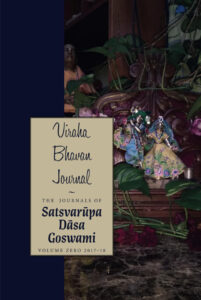
Viraha Bhavan Journal (2017–2018) was written by Satsvarūpa Mahārāja following a brief hiatus in writing activity, and was originally intended to be volume 1 in a series of published journals. However, following its completion and publication, Mahārāja again stopped writing books, subsequently focusing only on what became his current online journal, which began in August of 2018.
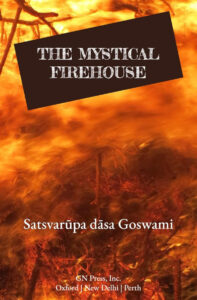
At first, I took it hard that I would have to live surrounded by the firemen, and without my own solitude. After all, for decades I had lived in my own house with my own books and my own friends. I was also now a crippled person who couldn’t walk, living among men who did active duties. But when Baladeva explained it to me, how it was not so bad living continually with other firemen and living in the firehouse with its limited facilities, I came to partially accept it and to accept the other men. I came to accept my new situation. I would live continually in the firehouse and mostly not go outside. I would not lead such a solitary life but associate with the other firemen.
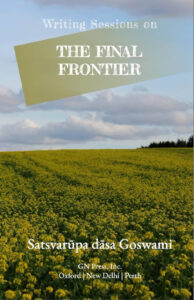
Let me write sweet prose.
Let me write not for my own benefit
but for the pleasure of Their Lordships.
Let me please Kṛṣṇa,
that’s my only wish.
May Kṛṣṇa be pleased with me,
that’s my only hope and desire.
May Kṛṣṇa give me His blessings:
Kṛṣṇa Kṛṣṇa Kṛṣṇa Kṛṣṇa Kṛṣṇa he
Rāma Rāghava Rāma Rāghava
Rāma Rāghava rakṣa mām.
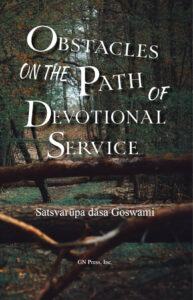
You mentioned that your pathway has become filled with stumbling blocks, but there are no stumbling blocks. I can kick out all those stumbling blocks immediately, provided you accept my guidance. With one stroke of my kick, I can kick out all stumbling blocks. —Letter by Śrīla Prabhupāda, December 9, 1972.
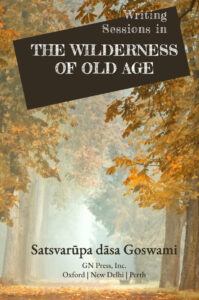
The Writing Sessions are my heart and soul. I’m trying my best to keep up with them. I am working with a few devotees, and they are far ahead of me. I wander in the wilderness of old age. I make my Writing Sessions as best I can. Every day I try to come up with a new subject. Today I am thinking of my parents. But I don’t think of them deeply. They are long gone from my life. Śrīla Prabhupāda wrote a poem when he was a sannyāsī, and he said now all my friends and relatives are gone. They are just a list of names now. I am like that too. I am a sannyāsī with a few friends. I love the books of Śrīla Prabhupāda. I try to keep up with them. I read as much as I can and then listen to his bhajanas.
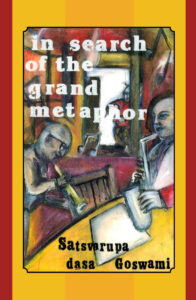
The metaphor is song. Explain it. Yes, particulars may not seem interesting or profound to readers who want structured books.
Wait a minute. Don’t pander to readers or concepts of Art. But Kṛṣṇa conscious criteria are important and must be followed. So, if your little splayed-out life-thoughts are all Kṛṣṇa conscious, then it’s no problem.
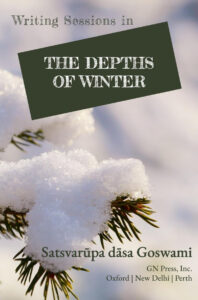
I am near the end of my days. But I do like the company of like-minded souls, especially those who are Kṛṣṇa conscious. Yes! I am prone to Kṛṣṇa consciousness. I have been a disciple of Bhaktivedanta Swami Prabhupāda for maybe almost sixty years. Sometimes I fail him. But I always bounce back and fall at his feet. It is a terrible thing that I sometimes do not have the highest love for him. It is a terrible thing. Actually, however, I never fall away from him. He always comes and catches me and brings me back to his loving arms.

This edition of Satsvarūpa dāsa Goswami’s 1996 timed book, Upstate: Room to Write, is published as part of a legacy project to restore Satsvarūpa Mahārāja’s writings to ‘in print’ status and make them globally available for current and future readers.
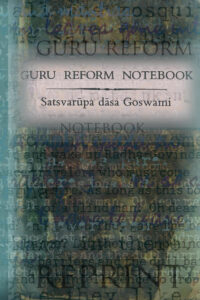
A factual record of the reform and change in ISKCON guru system of mid ’80s.

Readers will find, in the Appendix of this book, scans of a cover letter written by Satsvarūpa Mahārāja to the GN Press typist at the time, along with some of the original handwritten pages of June Bug. Together, these help to illustrate the process used by Mahārāja when writing his books during this period. These were timed books, in the sense that a distinct time period was allotted for the writing, during SDG’s travels as a visiting sannyāsī
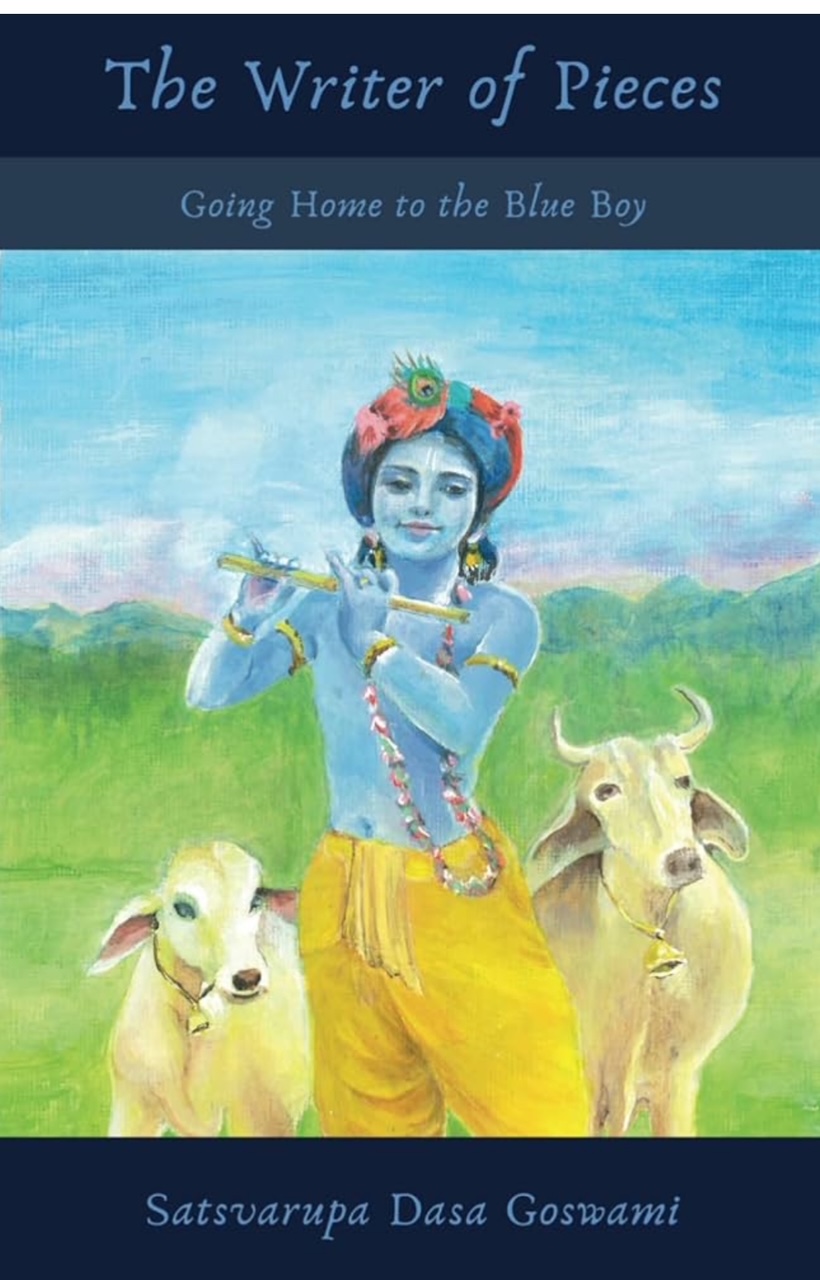
Don’t take my pieces away from me. I need them dearly. My pieces are my prayers to Kṛṣṇa. He wants me to have them, this is my way to love Him. Never take my pieces away.
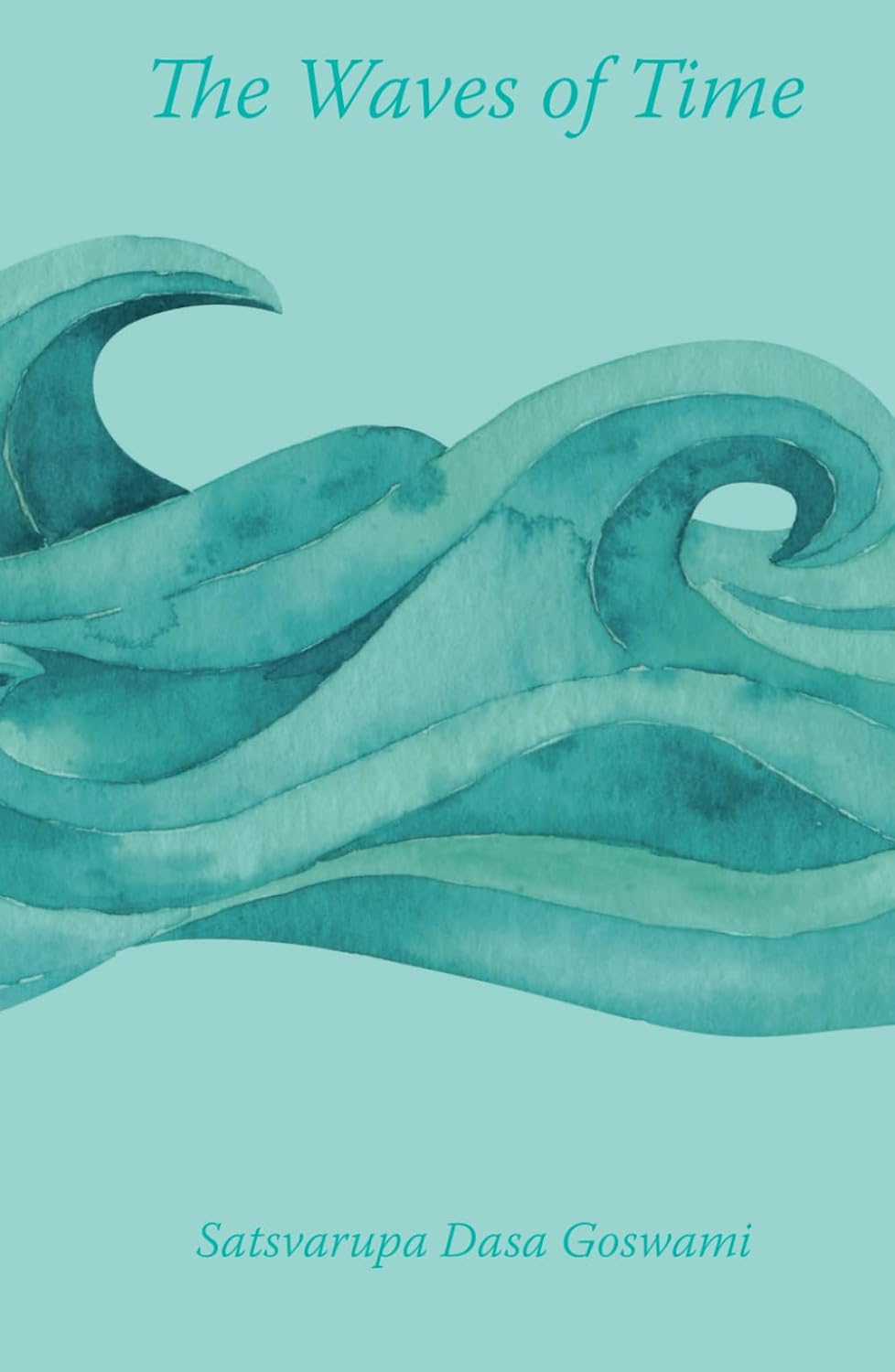
Many planks and sticks, unable to stay together, are carried away by the force of a river’s waves. Similarly, although we are intimately related with friends and family members, we are unable to stay together because of our varied past deeds and the waves of time.

To Śrīla Prabhupāda, who encouraged his devotees (including me) To write articles and books about Kṛṣṇa Consciousness.
I wrote him personally and asked if it was alright for his disciples to write books, Since he, our spiritual master, was already doing that. He wrote back and said that it was certainly alright For us to produce books.

I have a personal story to tell. It is a about a time (January–July 1974) I spent as a personal servant and secretary of my spiritual master, His Divine Grace A.C. Bhaktivedanta Swami Prabhupäda, founder-äcärya of the International Society for Krishna Consciousness. Although I have written extensively about Çréla Prabhupäda, I’ve hesitated to give this account, for fear it would expose me as a poor disciple. But now I’m going ahead, confident that the truth will purify both my readers and myself.

First published by The Gītā-nāgarī Press/GN Press in serialized form in the magazine Among Friends between 1996 and 2001, Best Use of a Bad Bargain is collected here for the first time in this new edition. This volume also contains essays written by Satsvarūpa dāsa Goswami for the occasional periodical, Hope This Meets You in Good Health, between 1994 and 2002, published by the ISKCON Health and Welfare Ministry.

This book has two purposes: to arouse our transcendental feelings of separation from a great personality, Śrīla Prabhupāda, and to encourage all sincere seekers of the Absolute Truth to go forward like an army under the banner of His Divine Grace A.C. Bhaktivedanta Swami Prabhupāda and the Kṛṣṇa consciousness movement.

A single volume collection of the Nimai novels.

Śrīla Prabhupāda was in the disciplic succession from the Brahmā-Mādhva-Gauḍīya sampradāya, the Vaiṣṇavas who advocate pure devotion to God and who understand Kṛṣṇa as the Supreme Personality of Godhead. He always described himself as simply a messenger who carried the paramparā teachings of his spiritual master and Lord Kṛṣṇa.

Dear Srila Prabhupada,
Please accept this or it’s worse than useless.
You have given me spiritual life
and so my time is yours.
You want me to be happy in Krishna consciousness
You want me to spread Krishna consciousness,

This collection of Satsvarūpa dāsa Goswami’s writings is comprised of essays that were originally published in Back to Godhead magazine between 1966 and 1978, and compiled in 1979 by Gita Nagari Press as the volume A Handbook for Kṛṣṇa Consciousness.

This second volume of Satsvarūpa dāsa Goswami’s Back to Godhead essays encompasses the last 11 years of his 20-year tenure as Editor-in-Chief of Back to Godhead magazine. The essays in this book consist mostly of SDG’s ‘Notes from the Editor’ column, which was typically featured towards the end of each issue starting in 1978 and running until Mahārāja retired from his duties as editor in 1989.

This collection of Satsvarupa dasa Goswami’s writings is comprised of essays that were originally published in Back to Godhead magazine between 1991 and 2002, picking up where Volume 2 leaves off. The volume is supplemented by essays about devotional service from issues of Satsvarupa dasa Goswami’s magazine, Among Friends, published in the 1990s.

“This is a different kind of book, written in my old age, observing Kṛṣṇa consciousness and assessing myself. I believe it fits under the category of ‘Literature in pursuance of the Vedic version.’ It is autobiography, from a Western-raised man, who has been transformed into a devotee of Kṛṣṇa by Śrīla Prabhupāda.”
 The Best I Could Do
The Best I Could DoI want to study this evolution of my art, my writing. I want to see what changed from the book In Search of the Grand Metaphor to the next book, The Last Days of the Year.
 a Hare Krishna Man
a Hare Krishna ManIt’s world enlightenment day
And devotees are giving out books
By milk of kindness, read one page
And your life can become perfect.
 Calling Out to Srila Prabhupada: Poems and Prayers
Calling Out to Srila Prabhupada: Poems and PrayersO Prabhupāda, whose purports are wonderfully clear, having been gathered from what was taught by the previous ācāryas and made all new; O Prabhupāda, who is always sober to expose the material illusion and blissful in knowledge of Kṛṣṇa, may we carefully read your Bhaktivedanta purports.

I use free-writing in my devotional service as part of my sādhana. It is a way for me to enter those realms of myself where only honesty matters; free-writing enables me to reach deeper levels of realization by my repeated attempt to “tell the truth quickly.” Free-writing takes me past polished prose. It takes me past literary effect. It takes me past the need to present something and allows me to just get down and say it. From the viewpoint of a writer, this dropping of all pretense is desirable.
 Geaglum Free Write
Geaglum Free WriteThis edition of Satsvarūpa dāsa Goswami’s 1996 timed book, Geaglum Free Write Diary, is published as part of a legacy project to restore Satsvarūpa Mahārāja’s writings to ‘in print’ status and make them globally available for current and future readers.